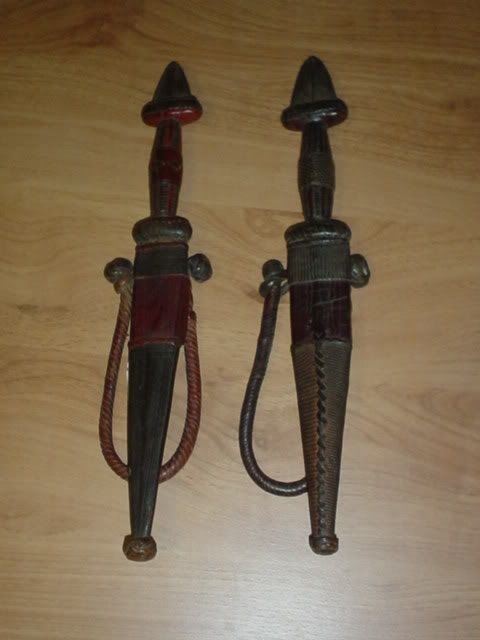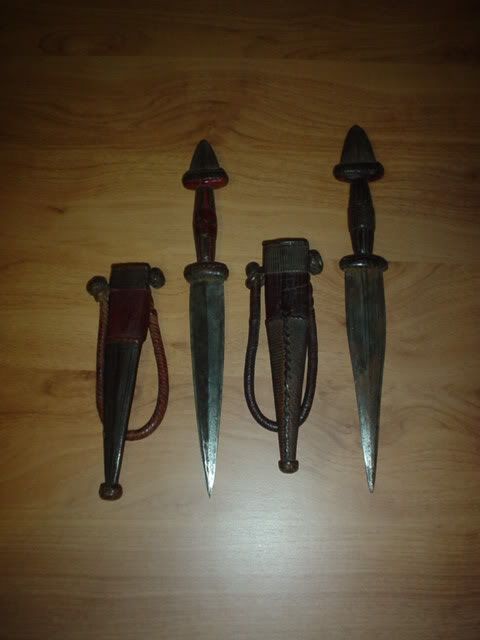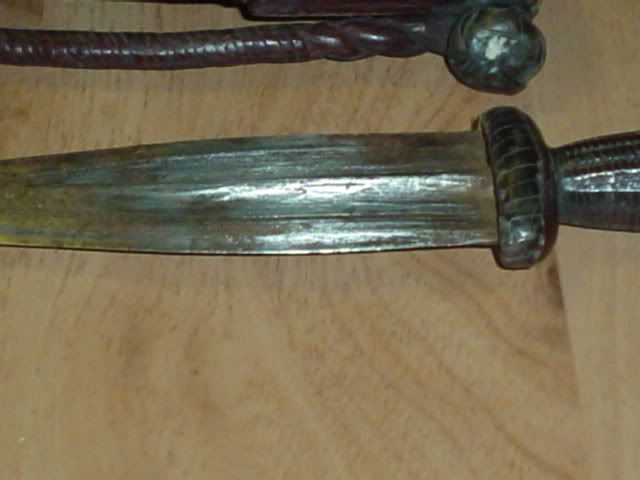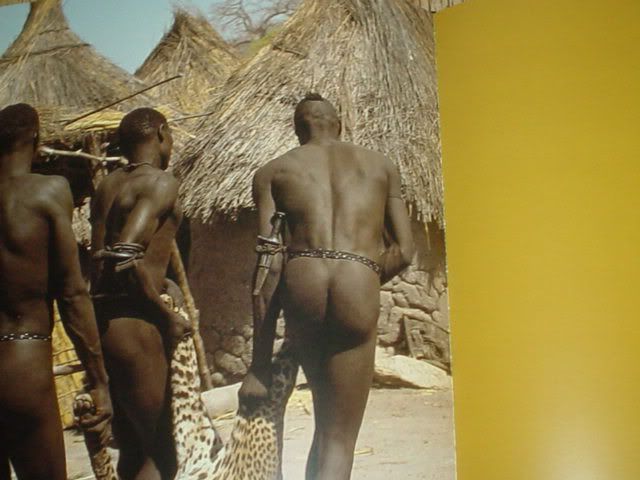
 |
|
|||||||
 |
|
|
Thread Tools | Search this Thread | Display Modes |
|
|
#1 |
|
Member
Join Date: Jan 2006
Location: Kent
Posts: 2,653
|
Hello everyone,
what a fantastic site.Reading through the various threads I have gained a certain amount of information, but I'm staggered at the detailed knowledge of many of the contributors! I have recently started a collection of African knives and spears and came across this small sword, which I took a risk on and purchased. The owner had no idea as to its origin, but had been owned by an older relative for a number of years. It measures 28.5''(720mm), the blade is 20.5'' (520mm) long, is 1 3/4'' (40)mm wide at the hilt, and sharply tapers to a point. The handle is covered in leather with a distinct 'basket weave' texture around the handle. It seems that the blade edges were never sharpened, which suggested to me it may be a 'stabbing' weapon, the point is very sharp. In the hand, the sword 'feels' that way to.My gut feeling is that it is North African, the handle seems to have a Roman Gladius (Mediterranean?) influence about it. The blade has been crudely forged, hammer marks very noticeable. The scabbard is thick leather, well made and is a good fit ( to the sword). If anyone has any information, I would be very grateful. Below are a few pictures, thankyou |
|
|

|
|
|
#2 |
|
Member
Join Date: Dec 2004
Location: What is still UK
Posts: 5,807
|
These come from the southern Sahara, a vast region from Chad to northern Cameroon and northern Nigeria. I think I have seen them referred to as tebu, tabu and toubou knives which I believe are the names of nomad groups from Chad. I think your example is very nice and of fairly recent manufacture and in my opinion far from crude, simple yes. I often find it can help to appreciate things if you think how would I make one of these in my shed, bearing in mind there are no DIY shops around where these are made. Tim
|
|
|

|
|
|
#3 |
|
Member
Join Date: Jan 2006
Location: Kent
Posts: 2,653
|
Thanks Tim. I used the word 'crude' not as a derogatory term, but rather as a way to descibe the forging of the blade I think there is a type of honesty in the fact that there is little or no machining in many examples of African weaponary. I have tried to forge a blade, and as you correctly state it is not as easy as it looks. I am sorry if you thought I was being insulting to the forger(s) of such weapons, but I am not.
Thankyou for the information, you have made my day. 
|
|
|

|
|
|
#4 |
|
Member
Join Date: Dec 2004
Location: Sint-Amandsberg (near Ghent, Belgium)
Posts: 830
|
What Tim said about the origin of this knife is correct. These knives are used over a vast area in Africa.
The size is, in my opinion, also an indication that it's a newer piece. These knives are also called 'arm knives'. They are worn on the upper arm, just above the elbow. I think a knife as long as yours wouldn't be easy to carry in this way. Normally, they have the size of small daggers. Both my knives measure about 29 cm (11,6 inches).    The blades of both knives are fairly thick. One even has a thick middlerib (last picture). The edges are sharpened, but as you said, they are probably more used for stabbing. I found a picture from a book by Leni Riefenstahl, who visited remote areas of Africa to make documentaries. One of her photos a man is shown wearing a knife on his left arm (look at the man on the right). It's not a knife like the ones above, but the way of carrying it is the same. These are Nuba of Kau, living in the south-eastern part of the Sudanese province Kordofan. 
|
|
|

|
|
|
#5 |
|
Member
Join Date: Dec 2004
Location: What is still UK
Posts: 5,807
|
Which book is this? I have "people of Kau" she has done remarkable work in the southern Sudan. Shame about her past but a girl has to make a living. Where are your sickle knives? Tim
|
|
|

|
|
|
#6 |
|
Member
Join Date: Dec 2004
Location: Ann Arbor, MI
Posts: 5,503
|
About 3 years ago I was at a small meeting in Feldafing: a very picturesque village in Bavaria, across the lake from Switzerland.
That's where Leni lived, and she even had her 100 yo birth party in our hotel. Having had one beer too many (in honesty, much more....) we all wanted to visit her in her home and ask for authographs. In the last moment, last functioning neurons prevailed and we stayed in the hotel, drinking more. About 3-4 miles from there there is a museum built by Lothar Buchheim (the author of "Das Boot"), abstract art and tons of African swords. |
|
|

|
|
|
#7 |
|
Member
Join Date: Jan 2006
Location: Kent
Posts: 2,653
|
Thanks Freddy,
it seems that African knife design is very 'fluid', adaptions and modifications seem very common. I think that is why my interest in African knives is growing. |
|
|

|
 |
|
|